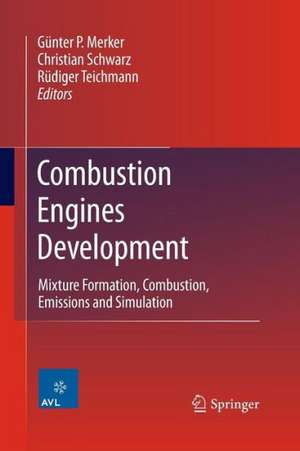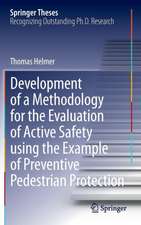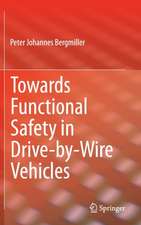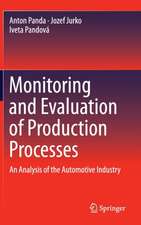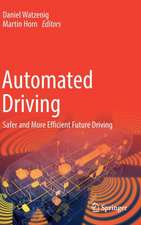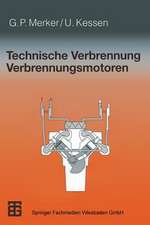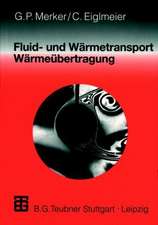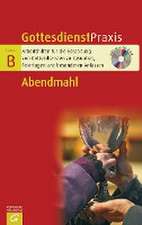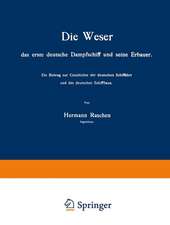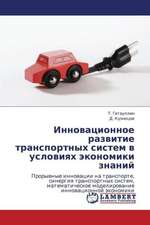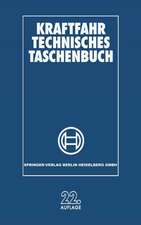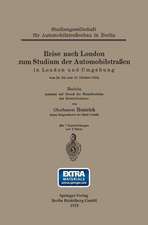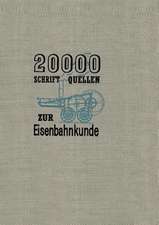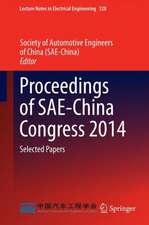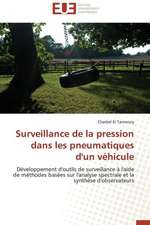Combustion Engines Development: Mixture Formation, Combustion, Emissions and Simulation
Editat de Günter P. Merker, Christian Schwarz, Rüdiger Teichmannen Limba Engleză Paperback – 28 noi 2014
| Toate formatele și edițiile | Preț | Express |
|---|---|---|
| Paperback (1) | 715.14 lei 6-8 săpt. | |
| Springer Berlin, Heidelberg – 28 noi 2014 | 715.14 lei 6-8 săpt. | |
| Hardback (1) | 971.81 lei 6-8 săpt. | |
| Springer Berlin, Heidelberg – 13 oct 2011 | 971.81 lei 6-8 săpt. |
Preț: 715.14 lei
Preț vechi: 841.34 lei
-15% Nou
Puncte Express: 1073
Preț estimativ în valută:
136.84€ • 142.87$ • 113.25£
136.84€ • 142.87$ • 113.25£
Carte tipărită la comandă
Livrare economică 05-19 aprilie
Preluare comenzi: 021 569.72.76
Specificații
ISBN-13: 9783642437700
ISBN-10: 3642437702
Pagini: 668
Ilustrații: XXV, 642 p.
Dimensiuni: 155 x 235 x 35 mm
Greutate: 0.93 kg
Ediția:2012
Editura: Springer Berlin, Heidelberg
Colecția Springer
Locul publicării:Berlin, Heidelberg, Germany
ISBN-10: 3642437702
Pagini: 668
Ilustrații: XXV, 642 p.
Dimensiuni: 155 x 235 x 35 mm
Greutate: 0.93 kg
Ediția:2012
Editura: Springer Berlin, Heidelberg
Colecția Springer
Locul publicării:Berlin, Heidelberg, Germany
Public țintă
Professional/practitionerCuprins
Part A: Foundations of thermodynamics and chemistry.- Introduction.- Reciprocating Engines.- Combustion Diagnostics.- Engine Combustion.- Reactionkinetics.- Pollutant Formation.- Part B: Simulation of the overall process.- Calculation of the real working Process.- Charging of combustion engines.- Exhaust-Aftertreatment systems.- Part C: Simulation of combustion and charging.- Total process analysis.- Phenomenological combustion models.- Three-dimensional flow fields.- Simulation of injection processes.- Simulation of combustion.- 3D-Supercharging Simulation.- Appendix.
Notă biografică
Univ.-Prof. Dr.-Ing. habil. Günter P. Merker was born in Augsburg/Germany in 1942. He studied mechanical engineering at the Technical University in Munich and received his diploma in 1969. He worked than as an assistant lecturer at this Institute and got his PhD in 1974 with a thesis on free convection problems. From 1975 to 1976, he has been as a research fellow at the Californian Institute of Technology in Pasadena/CA. Having returned to the Munich Technical University, he qualified as a university lecturer in 1978. From 1978 to 1980, he was with MTU GmbH in Munich. In 1980 he accepted an associate professorship for refrigeration technology at the University of Karlsruhe. In 1986 he started work at MTU Friedrichshafen, where he was head of the department analytics and engine calculation. In 1994 he accepted a full professorship for combustion engines at the University of Hannover. There he was head of the Institute of Technical Combustion until he retired in 2005. He was adviser to 43 PhD students. He is editor and co-editor of more than 140 technical scientific publications as well as six technical books on thermal transmission, fluid mechanics and combustion engines. He is a member of the Scientific Association in Braunschweig as well as of different technical committees. In addition to that, he works as an independent adviser for engine manufactories and service industries. Apl. Prof. Dr.-Ing. habil. Christian Schwarz was born in Regensburg in 1964. From 1983 to 1988, he studied mechanical engineering at the Munich Technical University. From 1989 to 1993, he worked as an assistant lecturer at the chair of internal combustion engines and vehicles at the Munich Technical University (Prof. Woschni). During that time he worked on unsteady, 0-dimensional process calculation for charged and quickly working diesel engines and got his PhD in 1993 on his thesis ‘Simulation of the transient reaction of charged diesel engines during operation’. Still at the sameuniversity, he was head of a team that worked on a part of the EU research project ‘Hybrid Zero Emission Mobility’ (1993 to 1997). In 1998 he qualified as a university lecturer, his treatise was on ‘Theory and Simulation of Charged Combustion Engines’. He was appointed private lecturer by the University of Hannover in 1999, and he got the venia legendi in combustion engines. Since then he has been teaching the subject ‘simulation of processes in combustion engines’. In 2004 the Hannover University conferred him the title ‘apl. Prof.’. In 1997 he started work in the department for advance development at BMW AG. In 2001 he was appointed head of this department and was responsible for the development of new combustion techniques for spark ignition (SI) engines, such as direct hydrogen ignition, as well as of new concepts for charged SI engines. Since 2004 he has been working in series development, being responsible for the development of combustion techniques of the SI engines produced in series. He has supervised several dissertations on combustion engines. Besides, he is the author and co-author of several publications and lectures, as well as of a technical book about combustion techniques and the charging of combustion engines. In the research association about internal combustion engines, he is head of the planning team for total processes, and he is also part of its scientific advisory board.Dr.-Ing. Rüdiger Teichmann was born in Nordhausen in 1960. He studied mechanical engineering at the Technical University Dresden from 1982 till 1987. After his study he became a research student and a scientific staff member till 1990. In 1991 he got his PhD with a thesis on combustion development for truck diesel engines.
In the same year he started his professional carrier in the department for advance development at BMW AG in Munich. His special fields of work were thermodynamic, combustion development, load exchange for gasoline engines andcalibration in series development as well. In 1999 he became the head of product management for the complete indicating measurement chain at AVL List GmbH in Graz. After 3 years he was nominated as segment leader “Indicating Measurement” and global business segment leader for “Combustion Measurement” in 2005. In addition to this responsibility he is in charge of the vehicle measurement activities from AVL since 2007. Mr. Teichmann is author and co-author of several publications and tutor of diploma thesis.
In the same year he started his professional carrier in the department for advance development at BMW AG in Munich. His special fields of work were thermodynamic, combustion development, load exchange for gasoline engines andcalibration in series development as well. In 1999 he became the head of product management for the complete indicating measurement chain at AVL List GmbH in Graz. After 3 years he was nominated as segment leader “Indicating Measurement” and global business segment leader for “Combustion Measurement” in 2005. In addition to this responsibility he is in charge of the vehicle measurement activities from AVL since 2007. Mr. Teichmann is author and co-author of several publications and tutor of diploma thesis.
Textul de pe ultima copertă
In the development of engines and vehicles it is nowadays standard practice to use commercially available computing programmes for simulation, not only of the transient reaction of vehicles or of the complete driveshaft, but also of the highly unsteady processes in the combustion chamber of an engine. Normally the source code is not available for these computing programmes and it takes too much time to study the respective specifications, so the users often do not have sufficient knowledge about the physical and chemical contents of the approaches that the programmes are based on. We have often been faced with this fact in talks to employees or in discussions during the presentation of results of simulation. Therefore it is our aim to point out different physical and chemical approaches and to show the possibilities and limits of the models used.
Caracteristici
Understandable and actual presentation of the simulation of combustion engine processes Practical guidelines, rules and recommendations Includes supplementary material: sn.pub/extras
